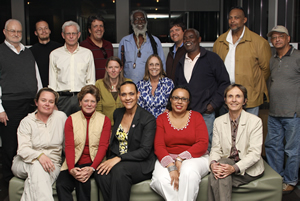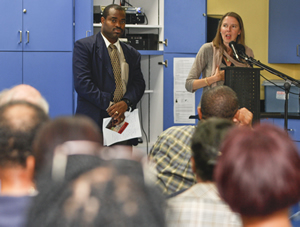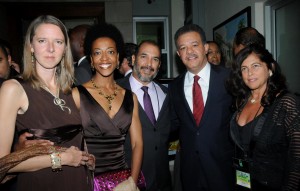Posted October 22nd, 2010 by Katrina Browne
Category: News and Announcements Tags: Cuba, Freedom Schooner Amistad, James DeWolf Perry, Katrina Browne, Traces of the Trade, Tulaine Marshall
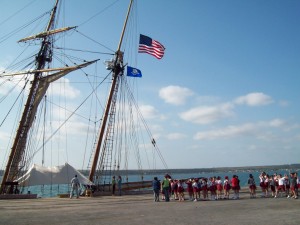 We were so thrilled to be able to go to Matanzas and Havana, Cuba in March as part of the Freedom Schooner Amistad’s visit there, which was the result of high level diplomatic discussions, given the significance of a U.S. flag vessel sailing into Havana harbor. The three of us that went were James Perry (cousin in film and our director of research), Tulaine Marshall (lead consultant for our multi-country partnership with the Amistad), and myself. Given the linkages in the two histories, it was very meaningful to be partnered with the replica ship: the story of the Amistad captives rebelling while aboard this vessel that was transporting them from Havana (where they’d been sold off a slave ship) to a plantation elsewhere on the island – and the fact that the DeWolfs were planters on the island during the same period and had been very much part of the illegal slave trade that flourished there.
We were so thrilled to be able to go to Matanzas and Havana, Cuba in March as part of the Freedom Schooner Amistad’s visit there, which was the result of high level diplomatic discussions, given the significance of a U.S. flag vessel sailing into Havana harbor. The three of us that went were James Perry (cousin in film and our director of research), Tulaine Marshall (lead consultant for our multi-country partnership with the Amistad), and myself. Given the linkages in the two histories, it was very meaningful to be partnered with the replica ship: the story of the Amistad captives rebelling while aboard this vessel that was transporting them from Havana (where they’d been sold off a slave ship) to a plantation elsewhere on the island – and the fact that the DeWolfs were planters on the island during the same period and had been very much part of the illegal slave trade that flourished there.
As readers who have seen the film can imagine, it was a big deal to be able to finally return to Cuba to show the documentary for the first time. I was nervous because during our final editing process, editor Alla Kovgan and I decided to take out two scenes in Cuba, with Cubans. As you may recall, the Cuba section of the final film shows very little interaction with Cubans, despite the entire week we spent visiting/filming with scholars, and speaking with Cubans we met in various places. Alla and I decided that the politics of race relations in Cuba is a whole complex stew, all the more loaded because of relations between our two countries, and that it digressed too much from our main themes in the film to delve into that in the limited space/time we had.
So I was nervous that Cubans would be offended that the time in Cuba in the film was so focused on our family and what we were going through.
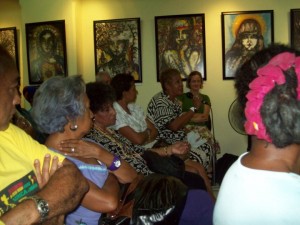 To all of our relief, the standing-room only audience at our screening was deeply moved and appreciative, including gracious scholars we had interviewed: Natalia Bolivar and Zoila Lapique. We heard from attendees that, while the communist government officially abolished racial discrimination after the revolution, issues of racism and privilege have lingered in Cuban society as they have elsewhere in the world. So they were eager to see Traces used as a resource for raising these issues because of the many parallels they saw in the film. The means for doing that are now being explored.
To all of our relief, the standing-room only audience at our screening was deeply moved and appreciative, including gracious scholars we had interviewed: Natalia Bolivar and Zoila Lapique. We heard from attendees that, while the communist government officially abolished racial discrimination after the revolution, issues of racism and privilege have lingered in Cuban society as they have elsewhere in the world. So they were eager to see Traces used as a resource for raising these issues because of the many parallels they saw in the film. The means for doing that are now being explored.
Hats off to Boris Ivan Crespo and other members of the Cuban film crew who enabled us to have such great filming in 2001 and who were able to come to the premiere to be appreciated for their handiwork.
 Another great breakthrough came when we were invited to speak to staff at the Cuban National Archives. There are several researchers there who specialize in the slave trade, and they have been disappointed that so many scholarly works on the slave trade do not involve research in Cuban archives, despite the centrality of Cuba to the slave trade and the Atlantic slave economy. Because the DeWolfs were so prominent in the illegal slave trade between the U.S., Cuba and Africa, we committed to work with our new colleagues to pursue licenses and funding such that new research collaboration can take place. We were able to see customs log books from the 1810’s and 20’s with names of vessels and captains that we recognized all too well.
Another great breakthrough came when we were invited to speak to staff at the Cuban National Archives. There are several researchers there who specialize in the slave trade, and they have been disappointed that so many scholarly works on the slave trade do not involve research in Cuban archives, despite the centrality of Cuba to the slave trade and the Atlantic slave economy. Because the DeWolfs were so prominent in the illegal slave trade between the U.S., Cuba and Africa, we committed to work with our new colleagues to pursue licenses and funding such that new research collaboration can take place. We were able to see customs log books from the 1810’s and 20’s with names of vessels and captains that we recognized all too well.
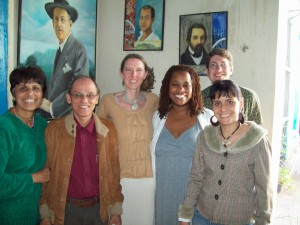 Lastly, the three of us were able to learn about a sixth DeWolf plantation, that we hadn’t previously known about, and to visit the location of one that we had not looked for in 2001. The AP wrote a story on that search.
Lastly, the three of us were able to learn about a sixth DeWolf plantation, that we hadn’t previously known about, and to visit the location of one that we had not looked for in 2001. The AP wrote a story on that search.
My thanks to the all the Amistad team, the Cuban and U.S. officials, and to our lead consultant Tulaine Marshall for making this incredible visit possible.
